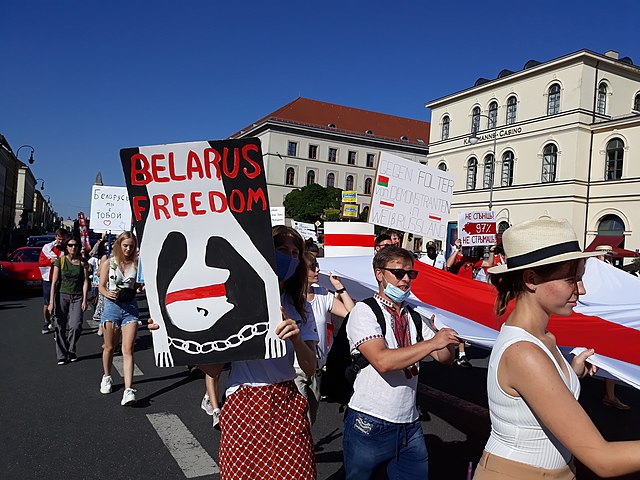Peaceful protests in Belarus deserve support
This Aug. 21 protest in Belarus proved to be just one of many. SOURCE: Henning Schlottmann / Wikimedia Commons
The bloodshed and sacrifice of innocent citizens in Belarus clearly shows the chaotic results that occur with the absence of democracy. Though younger than many students in The Hill School, students in Belarus are already participating in political action. As global citizens, Hill students must support the brave protesters in Belarus.
Peaceful protests in Belarus were shattered by an excessive crackdown, resulting in chaotic consequences. Over 200,000 pro-democracy people are protesting for Alexander Lukashenko’s resignation. President Lukashenko, nicknamed Europe’s last dictator, has won his sixth term with a reported 80.10% of the vote. However, the process was rigged with electoral manipulation. An exit poll from Moscow-based Belarus emigrants showed that President Lukashenko only got 6% in the initial election. Protesters are arguing for Belarus’ authoritarian president to resign.
Two people have been killed and hundreds injured. Forty students were detained on Sept. 2 after protesting to prevent President Lukashenko from stealing their future freedom and voting rights.
According to a CNN article from Aug. 23, the ministry of defense stated, “We are strictly warning: In case of disruption of the order and peace of these places, you will have to deal not with the police but with the army.”
President Lukashenko’s tactic is similar to that of a dictator. He quelled the protests with brute force, extensive use of the secret police, and military intervention. On Aug. 13, men released from the police revealed they were beaten with truncheons while women were forced to look and listen to the beatings of other victims.
However, President Lukashenko’s decisions further extended the scope of the demonstration, bringing 200,000 people onto the streets in Minsk, the capital. Soon after, some police officers started burning their uniforms and expressing advocacy towards the citizens. The laborers, who were President Lukashenko’s foundation of support, turned their back and initiated strikes and anti-government protests.
Women also lead peace protests. Some brave women in Belarus are emphasizing female power in politics. Contrary to that was President Lukashenko belittling women empowerment: according to USA Today, he argued earlier this year that “our constitution is not for women,” earlier this year. Women wore white dresses, carried flowers, and called for an end of the crackdown. Maria Kolesnikova, founder of a prominent cultural center in Belarus, expressed disapproval to the president by ripping her passport and jumping out of a car near the Ukrainian border.
So far, President Lukashenko has refused to resign or accede for new elections. However, Belarus’ movement can be perceived as a foundation for a democratic future.
In a column for Opendemocracy.net, Yury Glushakov, a historian and chairman of the Belarusian Green Party, commented, “Belarus will never be the same. The number of social groups involved in the Belarusian protest movement guarantees a broad front, but it also makes the emerging coalition internally fragile.”
The European Union and the United States should work together to facilitate a peaceful, safe environment in Belarus. While supporting a new peaceful election, the United States and the European Union should cooperate with the United Nations by isolating President Lukashenko with targeted sanctions, aiming for higher standards in civil rights, freedom of protests, and protection for activists dwelling in Belarus.
Hill students should actively contribute to the liberation and rights of Belarus. Therefore, the participation of providing financial assistance to targeted individuals will give protesters financial support communally. For example, the Belarus Solidarity Fund, by the Human Rights Foundation aims to raise money to support factory workers, state security forces who are opposing the government, journalists, and democracy supporters who are under threat.
Your support is critical to sustain the democratic movements. They can’t do it without you.

























